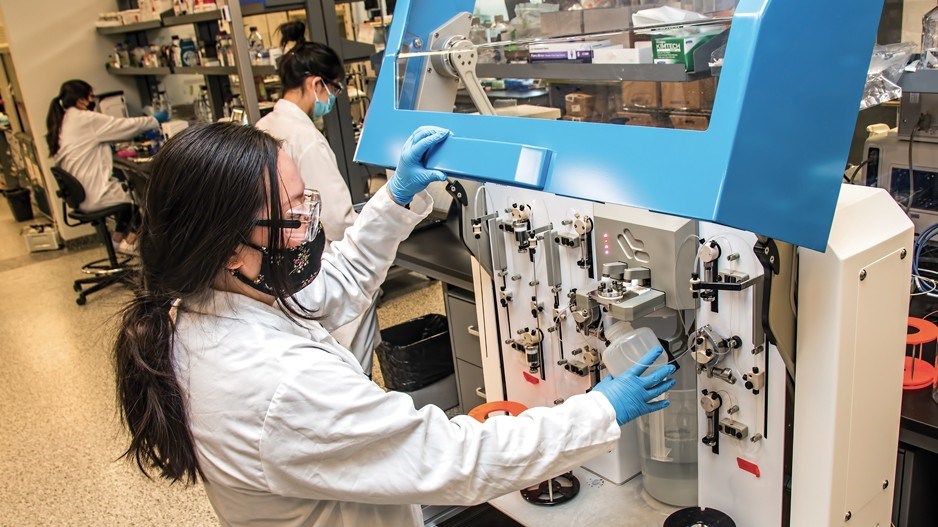Ottawa is embarking on a new biotech and life sciences strategy as the country deals with what one federal minister describes as the “sad reality” of domestic capacity.
Innovation Minister François-Philippe Champagne, who was in Vancouver Wednesday, outlined five pillars making up the new strategy, including building additional production capacity for the biotech sector, boosting access to talent and developing what he called “world-class regulation” to encourage innovation.
Other pillars making up the plan focus on governance and “doubling down” on made-in-Canada products, according to the minister.
“We can all agree as Canadians that it is somewhat of a sad reality that when the pandemic hit, our domestic capacity was so limited as pharmaceutical companies have been leaving Canada, as we all know, for decades,” Champagne said following a tour of Vancouver-based biotech firm Precision Nanosystems Inc. (PNI).
The new strategy comes after the federal government earmarked $2.2 billion in its last budget specifically for biotech and life sciences.
“What we were hearing from industry and from experts was it’s good to have attracted these investments,” Champagne said.
“But at the same time people wanted a vision, they wanted a strategy, they wanted [to address] issues around governance, and making sure that we have the talent pool, and the ecosystem and the regulation. So today it's bringing all of that together.”
B.C.’s life sciences sector has been particularly ascendant in recent years.
A June 2020 provincial government report – prepared prior to the pandemic – revealed the sector recorded nearly $5.4 billion in revenue in 2018.
That’s up 5.6% from 2017.
Meanwhile, a May 6 report commissioned by the Greater Vancouver Board of Trade noted the province’s biotech sector has been exceptionally active the past year with a record-breaking US$1.58 billion raised on the capital markets.
But a botched deal last year between Canada and Chinese vaccine manufacturer CanSino Biologics Inc. laid bare the country’s vulnerabilities amid efforts to devise a proper immunization plan for COVID-19.
Faced with Canada’s limited vaccine manufacturing capacity, the federal government began putting $44 million into revamping an NRC facility in Montreal to ensure it could produce CanSino doses at home.
But with the collapse of the CanSino deal and Canada being slow to procure competing vaccines at the outset, the country’s immunization push had been entirely dependent on vaccines produced outside the country: Pfizer Inc. (NYSE:PFE), Moderna Inc. (NYSE:MRNA) and — to a much lesser degree — AstraZeneca plc.
Last fall, Ottawa earmarked $18 million for PNI to pursue its own COVID-19 vaccine, which is expected to enter Phase 1 of clinical trials shortly.
PNI specializes in a class of vaccine known as self-amplifying RNA vaccines. These have the potential to create more potent vaccines as they amplify the signal, allowing PNI to manufacture more doses for less volume.
Its new 40,000-square-foot facility, expected to be completed in March 2023, would be able to produce up to 240 million of those self-amplifying RNA vaccine doses.
Pfizer and Moderna, meanwhile, have been manufacturing conventional messenger RNA (mRNA) vaccines, of which PNI has the capacity to produce two million to 24 million doses.
But last month U.S. innovation giant Danaher Corp. (NYSE:DHR) acquired PNI.
Terms of the deal were not disclosed but James Taylor, CEO of PNI, confirmed to BIV that his company would still be meeting its obligations to the Canadian government.
And plans for PNI’s new $50-million biomanufacturing facility in Metro Vancouver are still underway after the federal government revealed in February it was earmarking $25 million for the endeavour through Ottawa’s Strategic Innovation Fund (SIF) as part of a bid to shore up the country’s own domestic vaccine manufacturing capacity.
Meanwhile, AbCellera Biologics Inc. (Nasdaq:ABCL) is set to further expand its footprint in Vancouver after selecting a site in the city’s east side for a manufacturing plant.
The B.C. biotech company revealed last month its new 130,000-square-foot facility specializing in the production of therapeutic antibodies will sit on the 900-block of Evans Avenue.
A new 380,000-square-foot headquarters is also under construction three kilometres west in the city’s Mount Pleasant neighbourhood.
“Up until now we've been a research-based company,” Murray McCutcheon, AbCellera’s vice-president of corporate development, said at the time.
“We are tremendously excited at this announcement, which is allowing us to move forward with the construction of the GMP [good manufacturing practices] manufacturing facility so that we can develop and manufacture the antibodies that we discovered.”
The biotech company, best known for specializing in antibody discovery and partnering up with American pharmaceutical giant Eli Lilly and Co. (NYSE:LLY) on a COVID-19 treatment, raised US$555 million through a blockbuster initial public offering in December 2020.
Its new facility is being funded in part by a grant from the federal government’s SIF.
In May 2020, Ottawa earmarked $175.6 million from the SIF to AbCellera to bolster the country’s response to future pandemics both through the company’s existing drug discovery technology as well as the development of a manufacturing facility.
The deal struck with the federal government will see AbCellera match the SIF funding dollar for dollar.




